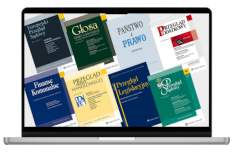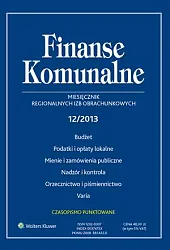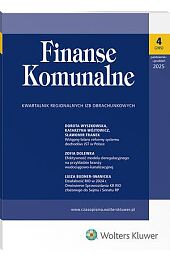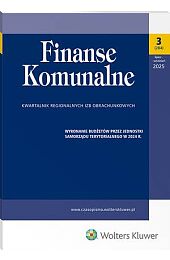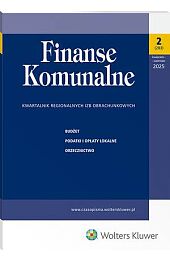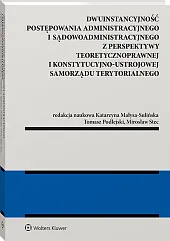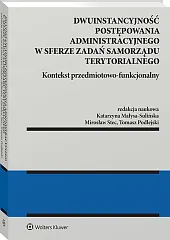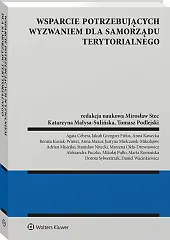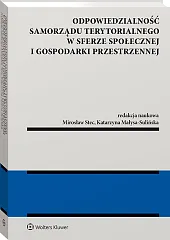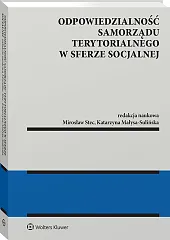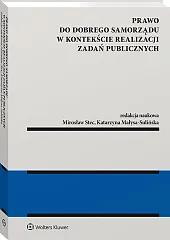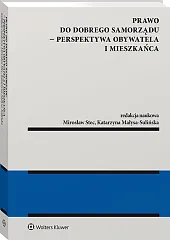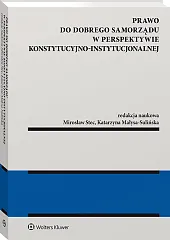ARTYKUŁY
Anna Ostrowska
str. 5
BUDŻET
Artur J. Kożuch, Kamilla Noworól, Janusz Sasak
str. 21
PODATKI I OPŁATY LOKALNE
Katarzyna Gawrońska
str. 31
MIENIE I ZAMÓWIENIA PUBLICZNE
Tomasz Wołowiec, Dariusz Reśko
str. 43
NADZÓR I KONTROLA
Rafał Trykozko
str. 53
DYLEMATY
Piotr Walczak
str. 64
VARIA
Lilia Abramchik
str. 69
Table of Contents & Abstracts
str. 76
Anna Ostrowska
Dotowanie sportu przez jednostki samorządu terytorialnego
Ponad 2-letni okres obowiązywania ustawy o sporcie skłania do oceny stosowania przepisów odnoszących się do dotowania klubów sportowych przez jednostki samorządu terytorialnego. Artykuł wskazuje na ich nieprecyzyjność, co stanowi niejako kontynuację problemów interpretacyjnych występujących pod rządami poprzedniej ustawy o sporcie kwalifikowanym. Na podstawie analizy orzecznictwa autorka ukazuje, jak powyższa nieprecyzyjność przepisów doprowadza do ustalania różnego (w zależności od regionu Polski) zakresu swobody dotacyjnej jednostek samorządu terytorialnego wobec klubów sportowych. Jej zdaniem wykształcone w tej sferze dwie, dość skrajne, linie orzecznicze powinny stać się przyczynkiem przeprowadzenia koniecznej nowelizacji art. 27 i 28 ustawy o sporcie.
Początek strony
Artur J. Kożuch, Kamilla Noworól, Janusz Sasak
Rachunek kosztów docelowych w procedurach tworzenia budżetu partycypacyjnego w jednostkach samorządu terytorialnego
Usprawnianie działalności jednostek samorządu terytorialnego wymaga namysłu nad sposobami planowania finansowego, wykonywania planów oraz kontroli efektów uzyskiwanych w wyniku świadczenia usług publicznych. Jest to zasadniczy przyczynek do szerokiego definiowania budżetowania oraz adaptacji i wykorzystywania w tym procesie rozwiązań sprawdzonych w sektorze komercyjnym. Przykładem takich rozwiązań - które autorzy poddają analizie - jest koncepcja rachunku kosztów docelowych i partycypacja odbiorców w konstruowaniu struktury wydatków służących zaspokajaniu potrzeb mieszkańców wspólnot samorządowych.
Początek strony
Katarzyna Gawrońska
Kompetencje rady gminy w zakresie zmiany uchwał dotyczących opłaty za gospodarowanie odpadami komunalnymi
Ustawowo przewidziany tryb wprowadzenia i realizacji przez gminy opłaty za gospodarowanie odpadami komunalnymi nie sprzyja stabilności gminnych uchwał dotyczących tego świadczenia. Autorka przedstawia w opracowaniu zakres kompetencji rady gminy do regulowania zagadnień związanych z opłatą, omawia podstawowe zasady dokonywania zmian już obowiązujących uchwał, jak również wskazuje możliwe konsekwencje takich działań.
Początek strony
Tomasz Wołowiec, Dariusz Reśko
Dopuszczalność powierzenia przez jednostkę samorządu terytorialnego wykonywania usług publicznych komunalnej spółce prawa handlowego
Celem artykułu jest ocena możliwości powierzenia przez jednostkę samorządu terytorialnego wykonywania usług publicznych komunalnej spółce prawa handlowego z pominięciem przepisów ustawy - Prawo zamówień publicznych. Realizując założony cel, autorzy dokonują analizy prawnej dopuszczalności zarówno takiego powierzenia, jak i jego warunków wynikających z prawa unijnego oraz krajowego. Analizie poddają także kwestie wzajemnych rozliczeń pomiędzy jednostką samorządu terytorialnego a spółką komunalną oraz problematykę pomocy publicznej związanej z przekazywaniem świadczeń spółce komunalnej.
Początek strony
Rafał Trykozko
Realizacja funduszu sołeckiego w świetle wyników kontroli regionalnych izb obrachunkowych
Zainteresowanie społeczne instytucją funduszu sołeckiego jest duże. Przejawia się to wskaźnikiem sołectw korzystających - poprzez złożenie stosownych wniosków - ze stworzonej przez radę gminy możliwości określenia przeznaczenia części środków budżetu. Część regulacji ustawy o funduszu sołeckim wymaga jednak - jak podkreśla autor - doprecyzowania, co wynika z zakresu nieprawidłowości stwierdzonych przez regionalne izby obrachunkowe w poszczególnych obszarach instytucji funduszu sołeckiego.
Początek strony
Piotr Walczak
Zwrot kosztów dotacji udzielonej z budżetu gminy na rzecz przedszkola lub innej formy wychowania przedszkolnego
Zagadnienia udzielania dotacji z budżetu jednostek samorządu terytorialnego na rzecz jednostek oświatowych, w tym przedszkoli publicznych prowadzonych przez inne podmioty niż jednostka samorządowa oraz przedszkoli niepublicznych, wywołują od wielu lat istotne wątpliwości związane z ustaleniem znaczenia obowiązujących w tym zakresie norm prawnych. W obszarze toczonych dyskusji - na co zwraca uwagę autor - pozostaje także kwestia charakteru zwrotu kosztów udzielonej dotacji na rzecz gminy dotującej, w sytuacji gdy do dotowanego przedszkola chodzi dziecko będące mieszkańcem innej gminy. Nowym elementem w tych rozważaniach, po ostatnich zmianach ustawy o systemie oświaty, stanie się również sposób ustalania kwoty tego zwrotu.
Początek strony
Lilia Abramchik
System of control and supervision of municipal finance in Belarus
The Constitution of the Republic of Belarus guarantees not only the right of self-government to the administrative subdivisions, but also requires them to use municipal property effectively and economically. For a long time, there was no time to study the problem carefully. Today, the development of the system of local government institutions and their activities is posing a problem in reconciling public-private interests and, furthermore, every person in the administrative-territorial unit not only acts as a taxpayer or a payer of charges within local governments, but is interested in the effectiveness of the use of communal property and the development of their region. It seems to me that the study of the system of control and supervision of municipal finance in the Republic of Belarus is very important.
Początek strony
